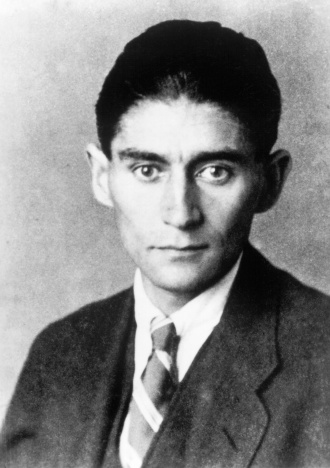K is for...Kafka, Kostova, and Kaestner
Happy Saturday, fellow A-Zers. We've made it through week two of the challenge and I'm feeling good! Today is all about the letter K and I'm bringing you the following authors: Franz Kafka, Elizabeth Kostova, and Erich Kaestner.
 Franz Kafka (1883-1924)
Franz Kafka (1883-1924)The first time I read Kafka, I was hooked. His work is dark, seedy, and brutal. Often he deals with themes of alienation, physical/psychological trauma, labyrinths, and terrifying quests, so there is a lot to be found in his work. Born in Prague, Kafka wrote all of his work in his native language of German which contrasted with the mainly Czech-speaking population of the city, thus causing much tension. Added to this, Kafka's Jewish heritage further alienated him from the masses. The majority of his work was published posthumously despite his wish that they be destroyed after his death. The pieces that were published during his lifetime, mainly in literary journals, attracted very little attention. In fact, Kafka never wrote a full-length novel and destroyed ninety percent of his drafts. Regardless, his work has influenced many writers, Sartre and Camus most notably, and spawned the term "Kafkaesque," which is used to describe surreal situations.
*Recommendation: The Complete Stories: specifically "The Metamorphosis" and "In the Penal Colony"
American novelist Elizabeth Kostova has written two novels so far: The Historian and The Swan Thieves. When The Historian was published, after a huge bidding war, it immediately shot to #1 on the New York Times bestseller list due to its heavy promotion, the first debut novel to ever accomplish this feat. Along with this, it was the fastest-selling hardback novel of 2005 in US history. Combining the story of Dracula with elements from varying genres, including Gothic, adventure, detective, travel, thriller, and the postmodern, the novel is more an eerie tale of discovery rather than a horror and it effortlessly blends the legends of Vlad the Impaler and history. I have yet to read The Swan Thieves, but it is on my bookshelf :)
*Recommendation: The Historian
Erich Kaestner (1899-1974)
*Recommendation: Emil und die Detektive (Emil and the Detectives)


Great selection! I believe I have a Kafka book on my bookshelf but I've never read it. I'll give it a look!
ReplyDeleteVisiting from the A to Z Challenge signup page. Great to meet you!
Stephanie Faris, author
30 Days of No Gossip
http://stephie5741.blogspot.com
Definitely read it! He's such an amazing writer :) Thanks for stopping by, Stephanie.
DeleteThis is the second Kafka reference I have seen in the K response. Love it. Good luck with the rest of A to Z. Sydney Aaliyah Michelle
ReplyDelete2014 A to Z Challenge
Nicole’s #atozchallenge Mighty Minion
Wow! That's awesome. Thanks so much for checking my blog out :)
Delete